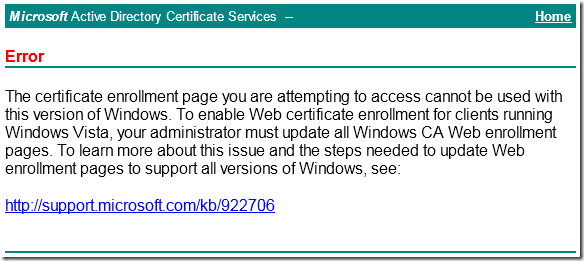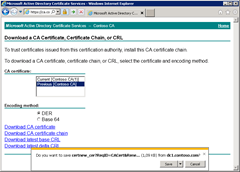Posts on this page:
- Install Certification Authority with PowerShell
- Web Enrollment pages fails after MS11-051 patch installation
- CA certificates and Untrusted Certificates container
- How to change CA certificate validity period
- You cannot download CA certificate from web enrollment pages
Hi there! PowerShell Crypto Guy is again here!
Today I've finished SetupCA.ps1 script testing and I'm ready to share it with you. Of course this is not the first attempt to install CA role from cmdline, there is already SetupCA.vbs script written by Windows PKI team. To be honest, this is not the first PowerShell script for CA installation from cmdline. The first attempt was made by Hasain Alshakarti — http://secadmins.com/?dl_id=3. However this script just illustrates basic API functionality with ability to specify CA name, CA certificate validity and CA type. There is no error handling at all, even whether the CA can be installed on the computer.
Read more →
SYMPTOMS
Consider the following scenario. You have Windows Server 2003 with installed Certification Authority and Web Enrollment components. When you try to access web enrollment pages from a Windows Vista-based (or newer) computer you receive a message box:

Read more →
As you may know a DigiNotar CAs was compromised due of some reasons (one, two). Microsoft have decided to break DigiNotar CAs trust at all — http://support.microsoft.com/kb/2607712. Trust breaking is performed as follows:
- DigiNotar CA certificates are removed from Windows Update;
- DigiNotar CA certificates are removed from crypt32.dll on Windows Vista+;
- DigiNotar CA certificates are moved from Trusted Root CAs container to Untrusted Certificates.
Read more →
Today I want to discuss one question about CA certificate validity and how this can be changed.
Issue background
A little abstract. When you install Windows Certification Authority the default value is 5 years. It is quite long period and many young administrators leave default value (especially if they are not very experienced in certificate services). After a time it appears that 5 years is too short validity for CA certificate and administrators lookups for a resolution.
Read more →
SYMPTOMS
When you try to download CA certificate from web enrollment pages you get a prompt message with unreadable proposed file name:
Do you want to save certnew_cer?ReqID=CACert&Renewal=1&Enc=bin (1,09 KB) from <ServerName>
Read more →




